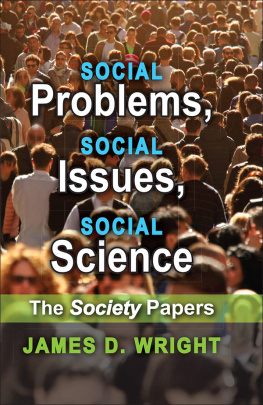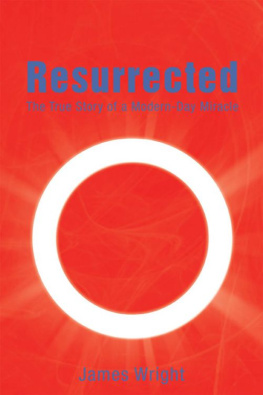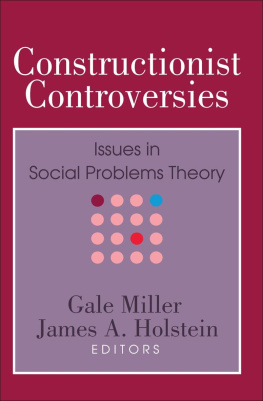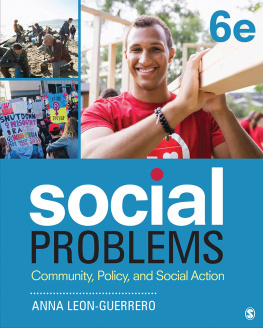Social Problems, Social Issues, Social Science
Social
Problems,
Social
Issues,
Social
Science
The Society Papers
JAMES D. WRIGHT
First published 2016 by Transaction Publishers
Published 2017 by Routledge
2 Park Square, Milton Park, Abingdon, Oxon OX14 4RN
711 Third Avenue, New York, NY 10017, USA
Routledge is an imprint of the Taylor & Francis Group, an informa business
Copyright 2016 by by Taylor & Francis.
All rights reserved. No part of this book may be reprinted or reproduced or utilised in any form or by any electronic, mechanical, or other means, now known or hereafter invented, including photocopying and recording, or in any information storage or retrieval system, without permission in writing from the publishers.
Notice:
Product or corporate names may be trademarks or registered trademarks, and are used only for identification and explanation without intent to infringe.
Library of Congress Catalog Number: 2016024051
Library of Congress Cataloging-in-Publication Data
Names: Wright, James D., author.
Title: Social problems, social issues, social science : the Society papers / James D. Wright.
Other titles: Society.
Description: New Brunswick : Transaction Publishers, [2016] | Collection of papers originally published in the journal Society. | Includes index.
Identifiers: LCCN 2016024051 (print) | LCCN 2016029031 (ebook) | ISBN 9781412863988 (hardcover) | ISBN 9781412863698
Subjects: LCSH: Sociology--United States. | Social problems-- United States. | Social sciences--United States.
Classification: LCC HM477.U6 W75 2016 (print) | LCC HM477.U6 (ebook) | DDC 301.0973--dc23
LC record available at https://lccn.loc.gov/2016024051
ISBN 13: 978-1-4128-6398-8 (hbk)
ISBN 13: 978-1-4128-6501-2 (pbk)
This collection of papers and recollections is dedicated to my mentors and collaborators: those who have shuffled off this mortal coilmy mother, father, and brother, all departed; to Pete, Andy, Julie, Irving, Steve, and Phil. And to those who remain: Richard, David, Dee, Joe, Joel, Dwayne, Beth, Charlie, Laura, Kevin, Laurie, Don, Gene, Jana, Peter, Amy, Rachel, and Sara. A special note of thanks to Mandi Barringer for assistance with the index. And finally to my wife Chris, whose love and attention have made my life possible for more than thirty-five years.
Contents
In 1946, the British poet W. H. Auden wrote a poem titled Under Which Lyre, in which he penned the Eleventh Commandment: Thou shalt not sit with statisticians, nor commit a social science. What follows is a chronicle of a life spent more or less exclusively sitting with statisticians and committing social sciencethat is, my life, recounted as a narrative spun through the papers, reviews, and polemics I have published in Society magazine since 1972.
Society was founded as Trans-ACTION: Social Science and Modern Society by Irving Louis Horowitz at Washington University (St. Louis) in 1962, was moved to Rutgers in 1969, and was renamed Society sometime in the 1970s. Early principals in the enterprise were Alvin W. Gouldner and Lee Rainwater, along with Horowitz. It was the journal in which my first scholarly paper was published, and like ones first love, I have had a fondness for Society ever since. I served as an Associate Editor from 1988 to 1997 and have published eighteen pieces therea reasonable sampling of the projects of my career.
I was a philosophy major at Purdue from 1965 to 1969, but pursued graduate work in sociology in part because my infelicity with languages ruled out a career in philosophy. You can scam an undergraduate philosophy degree reading English translations, but more advanced study means reading in the original languages.
That I would end up as a college professor was never in doubt. Back in the 1950s, graduation from elementary school was a big deal marking the transition from child to adolescent. So the occasion was marked by formal graduation ceremonies and a reading of the Class Prophecy and Will. Most of the girls, I recall, expected to marry, bear children, and keep house. Most of the boys aspired either to their fathers occupations or to being firemen or policemen. (Astronaut had not yet been invented.) My sixth grade Prophecy announced my intention to be a professor.
To a college kid in the late 1960s, sociology was an attractive major because sociology seemed to matter in ways other disciplines did not. Anthropology was amusing in a voyeuristic sort of way but of insufficient relevance to retain my attention. Psychology was then at its turn towards cognitive neuropsychology, so my Psych 101 class taught me a lot about the central nervous system but nothing at all about the psychology of prejudice or the effect of poverty on self-esteem. Economics was just plain boring and the only political science I found interesting was behavioral political science, that is, political sociology. As the founder Auguste Comte said, sociology was the Queen of the Sciences.
By the time I got to Wisconsin for graduate study in 1969, it seemed like everything of interest in the world revolved around sociology. Civil rights, youth culture, protest against the war, womens liberationwhatever the issue, sociologists were on the cutting edge, and not just researching and teaching about these issues, but even trying to do something constructive about them. When Wisconsin sociologist Joe Elder traveled twice in 1969 to Hanoi on behalf of the American Friends Service Committee to assess medical needs, deliver medical supplies to civilians in North Vietnam, and serve as a go-between from North Vietnam to Washington, sociology seemed like the most important thing in the world.
It is hard to say when the bloom went off the rose and sociology was dethroned (from Queen to Knave, perhaps), but the continued relevancy of the discipline was a much-discussed matter among graduate students at Wisconsin while I was there (196973). Much of the discussion centered on Gouldners The Coming Crisis of Western Sociology, published in 1970.
Rereading Gouldner a half-century later proves revealing. At the time, American sociology was equivalent (at least in Gouldners analysis) to the functionalist theory of society, although functionalism was already being challenged by conflict theory and various strands of neo-Marxian theorizing. The critics, Gouldner chief among them, felt that functionalism was ill-suited to the agenda of the welfare state. It was an expression of the organic model of society, with each part functionally linked to the successful operation of the whole and where change occurs slowly if at all.
The welfare state, in contrast, is a principal agent of rapid social change, the means by which social disorder and dysfunction are repaired. The crisis Gouldner foresaw was that the welfare state would come to expect that the social sciences would help them identify, define, and solve social problems. American sociology, Gouldner argued, was not theoretically suited to the task. If we define social problems ultimately as a breakdown of the moral order, how can they be fixed by new programs and interventions?
What the welfare state apparatus needs now, Gouldner wrote, is a social theory that is focally, and not peripherally, concerned with how conditions can be made better






